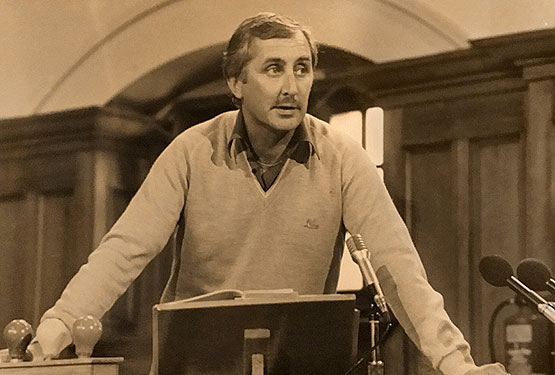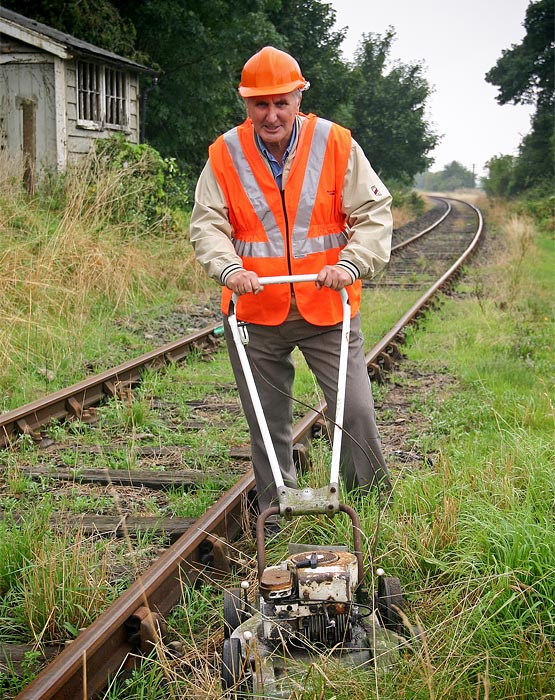Trackworkers lost a friend last month, even if they don’t know it: an advocate of the underdog, a voice for the silent. He was someone you could turn to when adversity came knocking, no matter who you were. He spoke up for what was right without belligerence, arrogance or showmanship, making the reluctant listen. And when they did they learned something because Ron Dunnabie knew the railway from the ballast up. He understood railwaymen too - what makes them tick, what makes them fallible - and there is no more precious a commodity in a workplace of high risks and fine margins.
Teenage Ron had no great aspiration to join the railway, but was persuaded to follow his father’s career path whilst waiting for something better. His eye was on an apprenticeship and expected his time with Darlington’s S&T department to be short-lived: a few months maybe. That was 1955. He retired in 2005 after serving the industry for just shy of 50 years.
Things were very different on the Fifties’ railway. Safety was unrecognisable. In the winter, trackworkers wore long black overcoats which soon became saturated when the weather turned inclement. Line blockages - when such things were vital - were secured by buttering up the signalman. Knowledge of which football team he supported stacked the odds in your favour. It was all very informal. Working in traffic was the norm, even at night. Under cover of darkness, trains would emerge from nowhere to pick off those in the wrong place at the wrong time. Fatalities hit home hard. The on-track community was tighter knit in those days and the names of local casualties were rarely unfamiliar. It was this experience that motivated Ron’s later role as a workforce safety agitator.
Ron was a diligent S&T man and well respected as such, both within his gang and more widely. He knew how important the job was and the need to get it right. Short cuts were not tolerated; neither was injustice from above, as any boss who crossed him would testify. He was the epitome of a team player, but his focus and sound judgement made him a natural leader: often firm, always fair, one for all and all for one.
|
| He was the epitome of a team player, but his focus and sound judgement made him a natural leader... |
|
His work took him to outposts on the north-east’s network that have long since grassed over - names that will spark memories for those of a certain age: Stooperdale Junction, Thorpe Thewles, Fighting Cocks. But he was at the cutting edge too, witnessing at first hand the development of Tees Yard as part of BR’s modernisation programme in the mid-Fifties. When serious defects were later found in the relay room there, Ron led one of the teams that rewired the place from top to bottom, working around the clock. Grangetown was a regular haunt, becoming a familiar face at the adjacent steel works where the canteen and steam room provided a welcome retreat. Call-outs to reset the tokenless block equipment on the branch to Boulby Mine did little for family life but proved a financial godsend. His mortgage was a substantial beneficiary of its incessant failings.
It was clear that Ron had qualities that would take him beyond the frontline. He was never off duty as a union rep, standing alongside those whose world was crashing around them through misfortune, error or recklessness. Even if the fight looked futile, he would always do his best for them at disciplinary hearings and won some unlikely victories. So it was no surprise when Ron took on a bigger role, earning a place on the RMT’s National Executive Committee in the early Nineties.
Union life was never dull. With a national strike looming, he was called to attend a conference as the last-minute replacement for another local rep who had gone sick. This involved a seven-hour overnight drive to Plymouth in ‘Black Bessy’, his faithful Austin Allegro. He played his part in a campaign to ensure that every prime mover had a proper headlight - an issue that might seem rather marginal to those sitting in offices, but not to Ron. He knew that even in bright sunlight it’s the first thing you see. This remained one of his proudest achievements, alongside efforts to secure a fair deal for the workforce at Jarvis. His relationship with management there was robust but cordial, and his willingness to engage reasonably with them earned a respect which brought dividends. He recalled their agreement - following difficult negotiations - as being amongst the best in the industry.

My first encounter with Ron was at the Track Safety Strategy Group where a collection of like-minded individuals came together in an effort to tackle the industry’s safety management shortcomings: trialling new kit, promoting better working practices and the like. Ron was part of the furniture having joined at inception as the RMT representative; I was there as a servant - a lowly video maker - with little understanding of what I was getting into. Ron lent a guiding hand - something I was very thankful for - although I still have the burn marks from the look he once gave me for finishing one of his sentences!
The meeting dynamics were fascinating. Of the 30 or so members, only a handful would speak on any given subject. Some offered a practical perspective, others pushed the corporate line. And then Ron would put his hand up. His contributions were understated but always sharp and insightful. He could be very dry, cutting any managerial nonsense to ribbons with well-honed proficiency. Either way, it was all based on irrefutable logic; as a result, he often had the last word.
Like many, Ron became disillusioned with the TSSG as its voice was increasingly stifled by a thought-police mentality. Practitioners melted away to be replaced by suits and so-called “safety professionals”. He didn’t have much time for them. But his last job reconnected him with reality, fielding calls from COSSs who rang into a Jarvis control centre to verify their safe systems of work. Look upon it as Rimini with a human face; a safety net where people replaced paperwork. And it worked too until Rimini brought its demise, much to Ron’s dismay.
Retirement brought a change of pace but he never lost the passion, continuing to make his presence felt through outpourings on this website. He revelled in the nickname ‘Jungle’ Ron, bestowed by the TSSG in honour of his one-man campaign for the return of safe cesses, the long-gone sanctuary alongside our railways offering refuge from passing trains. His focus on this said much about the man: with Ron it was all about feet on the ground, literally and metaphorically. But those above couldn’t see how right he was, even when poor cess conditions contributed to fatalities. And they did on more than one occasion.

Personally, I lost a friend too in September. For seven years, Ron and I made time for a monthly outing, visiting the country’s remotest corners in pursuit of adventure. Many trips were revelatory and uplifting, some were a bit daft in hindsight; but there were always laughs and chocolate éclairs. When Nigel came along - another old-timer from the S&T - we must have looked like refugees from Last of the Summer Wine, scrambling down embankments or up to our knees in mud. But what’s life without whimsy?
Ron Dunnabie made a difference, something we should all aspire to. Those he supported or worked alongside will remember his commitment and how much he cared. On learning of his death, one former TSSG member wrote: “I have met a couple of people in my life whose goodness transcended language and earned respect from people, regardless of perceived rank or status. Ron was one of those guys. He was a gentleman.”
Story added 1st October 2014